- Home
- Anne Frasier
Pale Immortal Page 3
Pale Immortal Read online
Page 3
Chapter 5
Using a pair of medical scissors, Rachel Burton snipped open the evidence seal she'd attached to the body bag while in the town square.
Tuonela's previous autopsy suite had been located in the hospital basement. When a family-owned mortuary closed, the town council purchased the current property in hopes of tempting a medical examiner to become a permanent part of the community. At the time Rachel was offered the position, the only requirement she'd insisted upon was a decent air-exchange system. But decent didn't translate to quiet.
She pulled down the clear visor.
Another part of the package had been a place to live. The mortuary was a sprawling Victorian with scalloped gingerbread siding, turrets, and copper fascia that had turned green. Rachel had the third floor. She liked being up high. She liked being able to look out over the town, especially at night when the lights were on. Another plus was having the entire building to herself except for occasional help and the bodies that came to visit.
She began the visual description, dictating into a microphone. "Rope burns on the ankles. Cuts on the wrists and jugular."
The young girl had already been identified by her hysterical parents as sixteen-year-old Chelsea Gerber.
So sad. So incredibly sad ..
After the visual, verbal description, and observations came the external exam.
When Rachel was in medical school, she'd quickly realized that her reaction to dead bodies was different from those of her fellow students. Some classmates were repulsed. Many commented on how it seemed that once death came to visit, it left behind an empty vessel. Like an old shoe someone had once worn.
It wasn't that way for Rachel ...
She found some straight dark hairs, complete with hair follicles, stuck to the body. Gerber was blond. She collected tissue scrapings and took photographs, numbering and labeling as she went.
The nails and cuticles were lined with blood. Rachel dropped cuttings into a small collection bag. She put the clippers on the metal tray near her elbow and held the young girl's hand.
Hands always got to her. Children's hands. A young man's hands. An old man's hands. Didn't matter. Hands were personal.
This hand held hers with unnerving urgency.
Even in death, Chelsea seemed to be clinging to life.
A half hour into the internal exam, Rachel had confirmation of what she'd suspected in the square. Every artery, every vein was lying as flat and white as a tapeworm. Chelsea had been strung up by her ankles and drained of blood like some slaughtered lamb.
Rachel let out a heavy sigh and sat down on a stool, trying to make sense of her discovery.
It was a chillingly familiar MO. An old case had involved exsanguination and a craving for blood. A very old case. A hundred years ago, in the ghost town that was now called Old Tuonela, a killer known as the Pale Immortal had walked the streets. When darkness fell, children were rushed inside. Doors and windows were locked up tight. Some claimed that the Pale Immortal had bathed in blood, and that blood had flooded the streets until the ground became saturated.
Even after the Pale Immortal's reign of terror ended, people were afraid. His death had come too late. A miasma of fear had grown over everybody. Many claimed the ground was cursed, and so a mass exodus had taken place. Every single person relocated to a new development five miles from the old one. A better location, they claimed. And prettier, on a bluff overlooking the river. Why had anyone settled at the old place, in such a dark valley? It didn't make sense.
Let's pretend Old Tuonela doesn't exist. Let's pretend we always lived here, in the new place.
Even though a hundred years had passed, many locals still liked to pretend Old Tuonela wasn't just beyond the outskirts of town where the softly rolling hills ended abruptly, the valleys became dark and deep, and the roads turned back on themselves. But for Rachel, Old Tuonela was a presence that couldn't be ignored. You could feel it, feel the connection between old and new, like an umbilical cord that hadn't been severed.
Years ago, a developer from Chicago bought the ground of Old Tuonela with plans to turn it into a resort. A place where the wealthy could escape Chicago for the weekend. Where they could shop and eat and sleep in quaint inns. When he couldn't get financial backing, he put up a for SALE sign and left, moving on to a new project. The for sale sign was still there. The only habitable house was being restored by the owner's son, who'd recently been through a tough time and needed a place to heal and pull himself back together.
And the current Tuonela? New people came but rarely stayed.
At first they were drawn by the charm of the cobblestone alleys and brick streets, by the church spires and dark thickets of trees. But a town that appeared quaint from the outside quickly turned threatening, with undertones that made strangers uneasy and paranoid. A darkness lingered here. A darkness that spoke to Rachel, that spoke to the people who belonged.
Over the years there had been campaigns to infuse Tuonela with new energy and life. A fall harvest tour. A May Day parade. Shopwindow displays through those dark days of December. Efforts always failed. And now there was a movement under way to rename Tuonela—because what had begun as a tribute to Finnish mythology had turned into a tribute to a murdering madman. But a name change wouldn't help.
There was an unspoken feeling that celebration was wrong. That too much noise might wake up something that should remain asleep.
Superstitious nonsense, Rachel told herself as she got to her feet and turned to get the camera. She was a rational person. Rational people didn't think such thoughts. But maybe rationality or superstition didn't matter in this case.
Imitation was the sincerest form of flattery.
What had triggered the renewed interest in the Pale Immortal? The release of Evan Stroud's most recent book?
There seemed to be two camps in town: those who were proud to have a local author writing about their history, and those who thought he should keep his mouth shut. That he was exploiting a tragic past.
From behind her came a sound that registered in another area of her brain, separate from the noise of the exhaust fan. Like air escaping. Like an indrawn breath.
Rachel swung around to see the dead girl's head turn slowly in her direction, her eyes wide open and staring. The hand Rachel had been holding earlier reached for her in an imploring gesture. Rachel let out a gasp. She took a panicked step back. The face changed, became that of another woman, one Rachel remembered from childhood.
Victoria.
Rachel's arm jerked and struck the tray, knocking the stainless-steel autopsy tools to the floor.
And then the vision was over, as if it had never happened.
Chelsea Gerber's eyes were closed, her chin directed toward the ceiling, her neck positioned on the autopsy block just as Rachel had left her.
Rachel ran blindly across the room and through the heavy swinging doors. Outside in the hallway she collapsed with her back to the wall, her chest rising and falling, her heart slamming.
In that instant she was reminded of why she'd become a coroner.
To face her fear.
The only way to defeat it is to meet it.
As a young child she'd seen people who weren't really there.
Her parents hadn't been overly concerned about her playmates until they realized these weren't your garden-variety imaginary buddies. Rachel was actually hanging out with dead people. The recently deceased of Tuonela.
Once Rachel moved away she was no longer visited by the dead. And as time passed, she came to rationalize her visions as delusions caused by some forgotten childhood trauma. She must have seen photo obituaries in the newspaper. She must have read the names or heard her parents mention them. All easily explained once you really thought about it.
Yet the girl in the room behind her was dead. Very dead. There could be no doubt about that. Which meant it was happening again.
♥ Scanned by Coral ♥
Chapter 6
Graham w
oke up confused and disoriented. It was dark, and his heart was thudding the way it did whenever he had a falling dream.
He thought backward, and a wave of bleak despair washed over him as his memory returned. He shot from the bed and felt around in the dark until he found a switch that he flipped on, illuminating the small space with dim light.
He was in some kind of storage room, maybe an office, cluttered with shelved books that overflowed in piles on the floor. The windows were covered in black fabric that looked like it had actually been glued to the glass. His mouth tasted rotten, and he could smell himself. He hadn't taken a shower in a long time, and he'd been doing some serious sweating lately. .. .
He opened the door and looked down the hall, spotting a bathroom.
He'd become an opportunist by necessity. He knew most things were fleeting, and you had to take what you could get when you could get it.
He grabbed wrinkled but clean clothes from his pack, moved silently down the hall, slipped into the bathroom, locked the door, and quickly stripped.
Don't think, he told himself once he was in the shower. This wasn't the time to think. He had to stay strong, stay tough.
He scrubbed himself and washed his hair. The warm water felt great, comforting. Dried off and dressed in wrinkled jeans and black long-sleeved T-shirt, he opened the bathroom door, a cloud of steam billowing out.
Evan Stroud was waiting for him in the living room, standing near the front door, a coffee mug in his hand.
He's so pale.
Like the vampire he'd claimed to be last night?
You should have come during the day. When I was asleep in my coffin. Don't you know anything about vampires?
He'd just been trying to scare him. Graham knew Stroud had a disease called porphyria, an allergy to the sun. He'd seen stuff about the illness on TV. A couple of little girls who could go outside to play only at night.
Graham hadn't thought about how white a person's skin would get if he never went outside. If he never even walked from the house to a car when the sun was shining.
"I never meant to fall asleep," Graham said, still feeling groggy. The dim light didn't help any.
"I called Social Services," Stroud said. "Someone will be here to pick you up soon."
"And then what?"
"They'll send you back to your mom, or find another place for you to live."
Graham nodded fatalistically. He wasn't surprised.
When he was little he used to daydream about meeting his dad face-to-face. In those daydreams his dad shed a few tears of joy in honor of the touching reunion.
"I'm not going back to her," Graham said. "I'll be sixteen soon. I'll become emancipated. Kids do that." He didn't know how, but he'd read about it. You had to find a lawyer, and you had to get some papers signed. "Why are you looking at me like that?"
"They don't emancipate kids who are a danger to themselves."
"Are you talking about the gun?" He waved his hand as if to diminish the act. He'd forgotten about that little episode.
Just think. If the gun hadn't been knocked away, we wouldn't be having this conversation.
This was pissing him off: Evan Stroud standing there, pretending he wasn't his father, yet at the same time preaching to him and bossing him around.
The phone rang. Stroud answered it, talking in quiet tones. When he hung up, he turned to Graham. "Get your things together. Someone will be here in a half hour."
Graham pivoted and strode to the bedroom, where his backpack was lying on the floor.
Stroud had washed and dried his muddy clothes. For some reason that gesture made Graham's throat tighten and his eyes burn. He grabbed the folded clothes and crammed them in his backpack. He zipped the pack and slipped his arms through the padded straps.
It wasn't a regular pack. It had been made for traveling, and he'd shoved a lot of stuff inside when he'd left Arizona. He was able to carry almost his entire life on his back. The only thing he regretted leaving behind was his vinyl collection.
What would she do with that? Throw it away? Take it to Goodwill?
"Thanks for all your help," he told Stroud once he was back in the living room. Would Stroud catch the sarcasm?
"I'm not your father."
"Right. She said you'd say that. But that's okay, you know. I don't care. We're strangers. You don't mean anything to me, and blood doesn't matter. I mean, being related doesn't mean shit. In fact, it gives somebody permission to treat you any way they want. That's all. I didn't want to come here. I didn't want to meet you. She made me."
"Do you always do what you're told?"
"No."
With that, Graham opened the door and stepped outside. After the darkness of the house the brilliance of the sun was blinding. He blinked rapidly, then leaped off the porch.
He heard footsteps behind him, and looked over his shoulder in time to see Stroud coming after him.
What...?
Graham had figured he'd stop at the door.
But he was coming. Just like any other guy. Just like somebody who wasn't allergic to the sun.
Graham turned and ran. A quick pause at the gate; then he was fumbling for the latch.
Lift. Pull. Run.
Graham could run like hell, but his pack was heavy. Maybe forty pounds.
"Wait!"
Graham turned in time to see Stroud drop to his knees, cupping both hands to his forehead. Graham stopped. He watched for a moment, then let his pack crash to the ground.
Stroud kept curling up, until his head was to his knees.
Like Superman exposed to kryptonite.
Or a vampire.
Graham hesitated, then ran back through the gate, slipping his hands under Stroud's arms. He dragged him toward the house. "Come on!"
Stroud managed to get his feet under him. With Graham supporting him, they staggered up the steps and over the threshold. Stroud dropped to the floor and Graham slammed the door, shutting out the light.
Heart pounding, Graham stared in horror at the man writhing at his feet. "Are you gonna be okay?"
Was he dying? Right in front of him?
Graham took one step closer. Then another.
Stroud's hand lashed out and locked around his ankle, fingers digging into his flesh, his arm all taut muscles and veins.
Like a clawed hand from a grave . ..
I could kill you right now. I could drain every drop of blood from you.
Graham tore away from him and ran—out the door, down the sidewalk, through the gate.
Grabbed his pack and hauled ass.
He headed for the cover of nearby trees and the wooded area he already had a relationship with, ducking under branches that snagged his T-shirt and caught on his backpack. Five minutes into his escape, he paused briefly to listen.
His pounding heart and harsh breathing drowned out everything else. Chest rising and falling, his breath creating a cloud in the thick air, he finally picked up on the sound of birds. From somewhere far away, water trickled. Then came the faint hum of traffic. Not heavy traffic, but an occasional vehicle.
He braced his legs and gave the backpack a heave and an adjustment; then he began running again: over a hill, then down a steep incline, his boots slipping, heels leaving deep parallel gouges in the muddy bank as he skidded to a stop at the bottom to land three feet from a two-lane road that twisted into hillsides topped with trees that were just getting leaves.
He risked a glance over his shoulder, half expecting to see Stroud floating toward him through the trees, blood dripping from fangs.
A small blue truck appeared around the corner, heading downhill.
Graham pivoted to face the oncoming vehicle. Continuing to walk backward, he stuck out his thumb.
The vehicle showed no sign of slowing, so he threw a little more into his performance. Pouring on the charm, he bent one knee while giving an exaggerated thumb gesture and a good-ol'-boy smile.
The truck flew past, a girl at the wheel.
Re
d brake lights followed by white reverse lights. Then the little Chevy S-10 hummed backward in a squiggly line.
"Hop in back!" the girl shouted through the sliding rear window.
It was starting to get dark, and from his angle he couldn't get a good look at her. All he could tell was that she had short blond hair and was about his age.
What the hell was she doing? A girl alone, picking up a hitchhiker on the road? Hadn't she ever heard of stranger danger?
He slipped the pack from his shoulders, tossed it into the bed of the truck, and followed. At least she had enough sense not to invite him into the cab.
She tromped down on the gas pedal, tires spinning on gravel as she shot back onto the road. She tossed more words at him through the window and over her shoulder. "Where you going?"
He scooted closer to the opening. "Where do people hang out in this town?" He was so hungry.
"The mall." When he didn't respond, she added, "Or a cafe called Peaches."
"That sounds good."
They picked up speed; he had to shout to be heard above the sound of the wind. "Just drop me off as near as you're going." Maybe he could panhandle for cash, or Dumpster dive for food if he had to. "I feel like I'm in confession."
"What?" She shot him a glance.
"Confession!" he shouted, pointing to the sliding window. She was probably Catholic. He'd probably just offended her.
She laughed, focusing once more on the road. "Well, then—confess!"
If she really knew about him, would she be repulsed? Scared? Feel sorry for him? He could be wrong about her, because people surprised you. She could have as much darkness in her life as he did. Because you couldn't always tell by looking at somebody.
Acting as though he hadn't heard her, he dug into the top section of his pack, pulled out his sweatshirt, put it on, and leaned back, arms crossed.
The tension left his body for the first time in days. He was free. At least for now.
In a short space of time the sun had disappeared completely, and darkness had fallen like a curtain. Strands of his hair whipped about, stinging his face, and he was riding in some girl's truck. Some girl he didn't know, heading to someplace called Peaches.

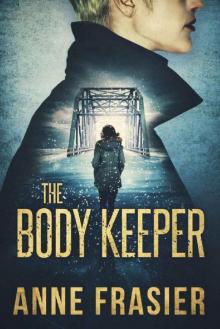 The Body Keeper
The Body Keeper Hush
Hush Play Dead
Play Dead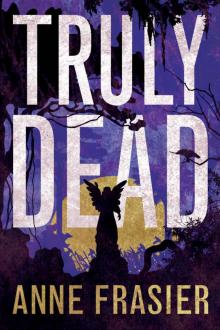 Truly Dead
Truly Dead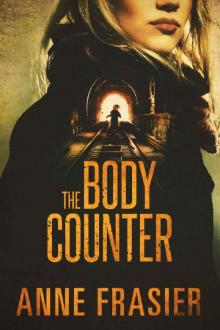 The Body Counter
The Body Counter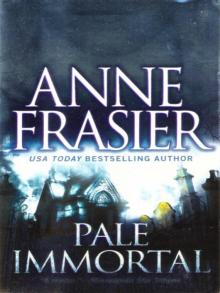 Pale Immortal
Pale Immortal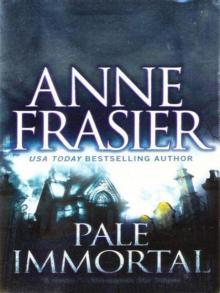 (2006) Pale Immortal
(2006) Pale Immortal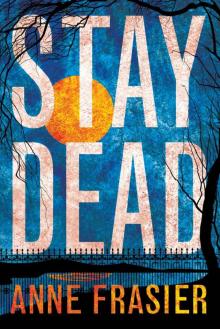 Stay Dead (Elise Sandburg series)
Stay Dead (Elise Sandburg series) Sleep Tight
Sleep Tight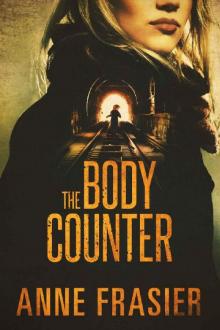 The Body Counter (Detective Jude Fontaine Mysteries Book 2)
The Body Counter (Detective Jude Fontaine Mysteries Book 2)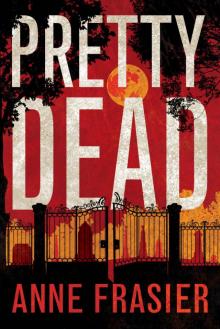 Pretty Dead
Pretty Dead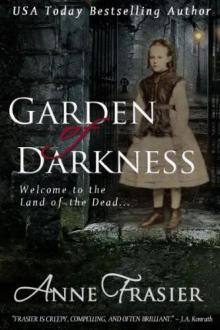 Garden of Darkness
Garden of Darkness